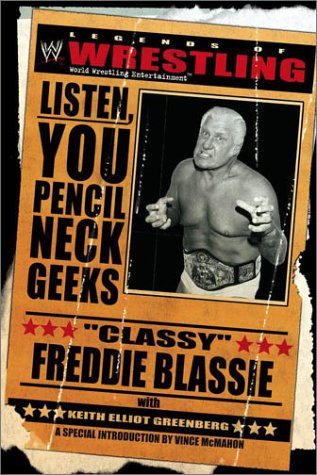
Review : "Listen, You Pencil Neck Geeks" by Freddie Blassie
6.14.3
|
"Listen, You Pencil Neck Geeks" is the official autobiography of wrestling legend "Classy" Freddie Blassie. I actually picked this book up about a month back but had left it near the bottom of my stack of books to read as I had just gotten a huge shipment in from Amazon. Suffice it to say, the passing of Blassie on June 2nd upped the location of the book to the top of my must-read list.
It is a fascinating book, as Blassie experienced just about every era of professional wrestling and his perspective provides quite an education for anyone interested in what it was like breaking into the business in the 1930's. Back then, there was no smartening up young prospects as to the inner workings of the genre, you just picked up bits and pieces as you went along until you knew it was all a work. However, it wasn't nearly as choreographed and there were quite a fair share of "shoots" or bouts that broke down into legitimate fights and Blassie details some great moments when such incidents occurred.
|
 |
Blassie earns respect for not spouting the typical old-timer line of how the wrestlers of his day would whip the present day wrestlers in a "shoot." He freely admits that the level of athleticism of the past eras has been romanticized to a great extent, even asserting that todays stars like Kurt Angle, Brock Lesnar and Chris Benoit would easily defeat just about any star from the past.
Some of the most unique and enlightening aspects of the book are the various breaks in his narrative where different stars give their perspective on the events he is discussing. Such legends as John Tolos, Dick "The Destroyer" Beyer, Killer Kowalksi, The Iron Sheik, and Hulk Hogan add their point-of-view to the picture that Blassie paints and you can see how much cooperation and genuine brotherhood there is within the wrestling fraternity. Blassie's wife and his son of a previous marriage also add perspectives to the more personal parts of the story of his life.
Two portions of the book stand out for their emotional impact. The first is Blassie's telling of his meeting and subsequent adventures with his friend comedian Andy Kaufman. The sadness conveyed by Blassie at Andy's passing and to hear, from Andy's friends no less, how highly he regarded Blassie really show the special bond that existed between these two unique individuals. The final chapter is by far the most emotional of the book, perhaps more so now that Blassie has passed away. In it, he reflects on his life. His regrets regarding his estranged relationship with two of his children and their grandchildren is a serious tearjerker. And, one story of how he attended a WWE event at Madison Square Garden in October 2001. After initially insisting that no one would be interested in seeing him there, he is surprised that many of the present-day WWE stars went out of their way to greet Blassie and reflect on his outstanding career. The subsequent standing ovation he received from the fans in attendance show the amazing level of respect commanded by one of the WWE's founding fathers.
This book is a must-read for any wrestling fan interested in the days before the WWE became synonymous for "pro.wrestling" in the minds of America. If you enjoy it, pick up Lou Thesz's Hooker for a less colorful but more detailed account of many of the same roads Blassie traveled. And then when someone insists "WWE made pro.wrestling" just call them a pencil neck geek.